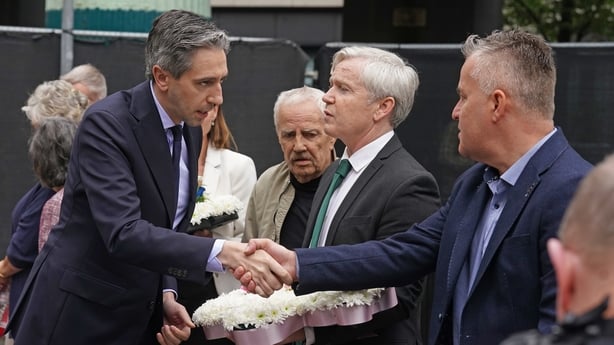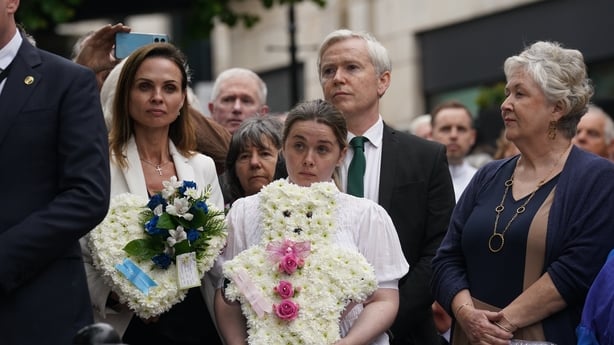President Michael D Higgins has laid a wreath at the monument for the seven people who lost their lives in the 1974 bombing in Monaghan town.
Hundreds of people gathered at Church Square in the centre of town, just metres from where a no-warning car bomb exploded on the evening of 17 May 1974.
At 6.58pm this evening, church bells rang out across the town, marking the precise time of the blast.
A total of 34 people were killed in the bombings in Dublin and Monaghan, including an unborn baby. Up to 300 others were injured.
Nobody has ever been charged or convicted over the atrocity, which was the single biggest loss of life during the Troubles.
During the evening rush hour on 17 May 1974, three no-warning car bombs exploded almost simultaneously in Dublin.
A fourth bomb went off outside a pub in Monaghan town around an hour-and-a-half later.
Loyalist paramilitary group the UVF claimed responsibility for the attacks and there have been persistent allegations over the years of collusion between the loyalist gang, and British security and intelligence services.
Relatives of those who died laid wreaths at the memorial in Monaghan.
Minister for Social Protection Heather Humphreys, representing the Government, addressed the commemoration event.
She told those gathered that the Government would do everything possible to ensure access to justice.
Minister Humphreys said that the British government's "ongoing refusal to release relevant documents" remains a "fundamental barrier to achieving justice".
She also acknowledged "where we have fallen short in this jurisdiction", and said that the voices of families had been left alone to demand answers for many years.
Earlier, President Higgins said it is "not morally acceptable, nor is it politically feasible" to ask those affected by the Troubles to forget about the past.
He was speaking at a wreath laying event that took place in Dublin.
During his address, President Higgins said we should not ask people to "forget about the past, draw a line or move on in the name of any naïve desire for a supposed closure that may never be attainable".
He said: "We share, on this island and beyond, a collective responsibility to find a way to deal ethically with the legacy of the Troubles.
"A strategy of feigned amnesia, or hoping time will deliver one is simply not an option, nor is any strategy of continuing the protection of previous evasions or failures to act," President Higgins said.
Mr Higgins said he shares with the families "of their feeling of being abandoned and failed by the system, of their being denied justice for the loss of loved ones".
He said they need "more than an empathetic ear" and "justice demands that they deserve the truth, no more, no less".
The President said it must include a "clear account of the context, the information shared and the knowledge as to preparations for what happened to and caused the death and injuries" during the bombs.
He noted that earlier this week the Dáil called for the fourth time for all documents held by the British government in relation to what happened to be released.
He also said that the people of Ireland "stand in solidarity" with the families and loved ones of the Dublin-Monaghan bombings.
The pain caused by what happened has been added to by "the long wait for information on those tragic events", Mr Higgins said.

He added that "unanswered questions remain", and that providing answers should be "a basic right by any standard of justice".
"Like the families of so many other victims and survivors of the Northern Ireland conflict, so many of you here today have been trying to find answers about what happened," he said.
Taoiseach Simon Harris and Tánaiste Micheál Martin also attended the event, along with the Lord Mayor of Dublin and the Cathaoirleach of Monaghan County Council.

Earlier, a mass took place at St Mary's Pro Cathedral in memory of the people who died and were injured in the bombings.
The mass on Marlborough Street - just a few hundred metres from where the second bomb exploded on Talbot Street - began at 10.30am.
We need your consent to load this rte-player contentWe use rte-player to manage extra content that can set cookies on your device and collect data about your activity. Please review their details and accept them to load the content.Manage Preferences
It was attended by Mr Martin, as well as family members and survivors of the four bomb attacks.
At the start of the Pro Cathedral mass this morning, Archbishop of Dublin Dermot Farrell read out the names of those who died in the atrocity.
He told those attending that the names represent "lives cut short, hopes destroyed, love and longing taken away from those for whom it was created".
"We call out their names, we name our loss," he said.
"They're not forgotten, we remember."
Archbishop Farrell said how people choose to live their lives now, in peace, should be seen as "a living memorial for those we have lost".
He said reconciliation "is not just breaking bread, it is reconciliation with other" and someone who has hurt you "and that is no easy task".
With additional reporting by Fiachra O Cionnaith
Read more:
'There were bodies lying everywhere' after deadly blasts
Timeline: How the Dublin-Monaghan bombings unfolded






